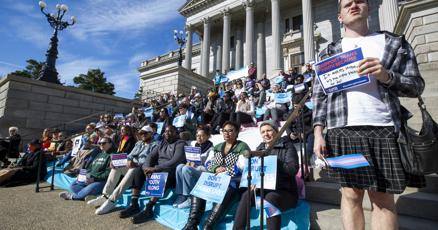
A Statehouse committee approved a bill on January 10 to prohibit gender-affirming treatment for anyone under the age of 18 in Columbia, bringing South Carolina one step closer to banning trans care for minors.
This decision was made despite vehement opposition from supporters and individuals who pleaded with lawmakers, as well as objections from Democrats who claimed it was a politically motivated move by the Republican majority.
Only a few Democrats voted against the proposed restrictions, which were quickly approved by the House Medical, Military, Public, and Municipal Affairs Committee.
Rep. Wendell Gilliard, D-Charleston, expressed embarrassment that this issue was prioritized in the Legislature given the other challenges facing the state. He noted that the bill was heard by a committee on January 9, with the vote taking place the following day.
During the committee meeting on January 10, 2024, at the South Carolina Statehouse in Columbia, Rep. Wendell Gilliard (center, back row) expressed his concerns about H. 4624, legislation that would prohibit gender-affirming health care for transgender children. The bill was swiftly approved by the House Medical, Military, Public, and Municipal Committee and is now headed to the Assembly. Staff photo by Laura Bilson
Before the vote, the committee heard from 48 individuals, with 47 opposing the regulations. The Alliance Defending Freedom, a regional organization that opposes trans care, had one attorney as its sole supporter, testifying via Zoom.
Rep. J.A. Moore, D-North Charleston, said, “This isn’t about understanding medical realities. It’s about politics, I’m sorry to say.”
The bill’s co-sponsor and House Majority Leader David Hiott, R-Pickens, stated that it is a top priority for the administration. He argued, “God created both men and women when he created us,” and asserted the need to fight against those who want to alter that from birth throughout their lives.
The bill would prohibit the use of public funds for minors’ hormone treatment, puberty blockers, and surgeries. There are 22 states, including nearly all states bordering South Carolina, that prohibit these treatments for minors.
Providers who violate the state’s ban on these services could face charges of unethical conduct and disciplinary action against their licenses.
Dr. Elizabeth Mack, president of the American Academy of Pediatrics, stated that these procedures are not currently performed in South Carolina. She emphasized that gender-affirming care is widely regarded as safe and essential by the medical community. No major medical organization opposes gender-affirming care, and it is only administered after a thorough process and discussions with parents and doctors.
However, some lawmakers raised concerns about the age of consent. Rep. Fawn Pedalino, R-Manning, faced mockery from the audience when she said she wasn’t trying to restrict people’s life choices. She argued that individuals should be able to make these decisions once they reach 18 years of age.
Rep. Jordan Pace, R-Goose Creek, pointed out that the state already imposes age restrictions to protect children from certain choices, such as getting tattoos, until they reach adulthood.
Rep. Wendell Gilliard, D-Piedmont, argued that the bill, while claiming to be a champion of liberty and freedom, restricts the freedom of parents and families, suggesting a need for self-reflection.
Following the committee’s approval, supporters and individuals held a rally, sitting on oversized pink and blue transgender rights flags draped across the steps of the Statehouse. They waved signs that read “Trans Youth Belong” and spontaneously chanted “Vote them out” as speakers denounced the swift action.
Families have vowed not to remain silent, and advocates are committed to challenging the law if it ultimately passes.
South Carolina ACLU member Matthew Butler offered words of hope, saying, “Don’t give up hope. South Carolina can get better.”



